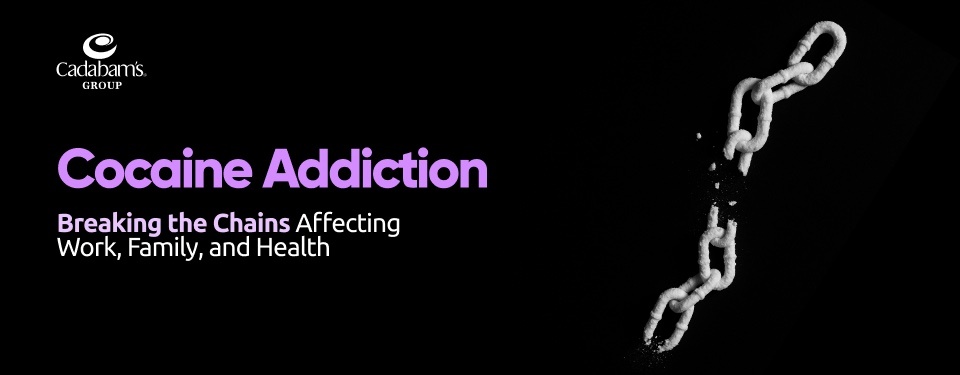Cocaine, which is a stimulant drug, has negative effects on society with consequences felt in different aspects of life. According to the statistics that have been obtained recently, millions of individuals from around the globe suffer from cocaine dependency, which affects their ability to work, maintain interpersonal relationships with their families, as well as their financial status. This article focuses on the social, psychological and physical impacts of cocaine addiction.
Understanding Cocaine Addiction
Cocaine dependency is an illness that is defined by the preoccupation with the habit of utilising cocaine even in situations that cause detriment. It is addictive because it changes the brain reward system, thus providing a hard time for users to stop taking the substance.
How Cocaine Affects the Brain and Body
Cocaine boosts up the dopamine in the brain creating high feeling and energy. However, frequent use interferes with normal brain activity and leads to drug tolerance, addiction, and other severe complications such as heart attacks, strokes, and respiratory disorders.
Signs of Cocaine Addiction
Signs of cocaine addiction include increased consumption, inability to decrease use, irresponsibility, and experiencing cravings. The behavioural changes involve increased incidences of secrecy and sudden mood swings are also characteristic of the condition.
What Causes Cocaine Addiction?
The factors that lead to cocaine addiction include genetic makeup, environment, and psychology. Stress, peers influence and mental health issues are other factors that explain why some people start and persist in the use of cocaine.
Who is at Risk for Cocaine Addiction?
It takes its toll on people with a family history of drug dependency or those with mental ailments or stressful occupations. Young adults and people with substance use disorders are more at risk.
Effects of Cocaine Addiction on Family Life
The consequences of using cocaine go beyond personal ramifications. There are severe impacts of cocaine abusers on family systems.
Strain on Marital Relationships
Cocaine addiction can lead to trust issues, frequent conflicts, and emotional distance, putting immense strain on marital relationships and often resulting in separation or divorce.
Parenting Challenges
Addicted parents may struggle to provide a stable and nurturing environment for their children, leading to neglect, inconsistent discipline, and emotional unavailability.
Emotional and Psychological Impact on Family Members
These situations make a home environment toxic and stress the family members. They tend to also develop anxiety, depression and helplessness due to the addict’s behavioural and the effects it has on the entire family.
Impact of Cocaine Addiction on Work-Life
Cocaine dependency can cause significant social and workplace impairment and stability in the workplace.
Job Performance and Productivity
Cocaine addiction leads to impaired cognitive function, decreased focus, and erratic behavioural, significantly reducing job performance and productivity. Chronic users may struggle to meet deadlines and fulfill their responsibilities.
Workplace Relationships
Cocaine is likely to produce temper fluctuations and increased impulse to create tension in the employee's relations. People at the workplace may begin to lose confidence in one other and even develop animosity towards one other, thus declining working relationship and cohesiveness.
Absenteeism and Job Stability
Compulsory and voluntary absence due to substance use or its treatment may undermine work security. Employed and addiction-affected individuals are at an increased risk of getting disciplined and fired and have poor chances of securing new jobs.
Health and Safety Concerns
Cocaine has severable health effects on the heart leading to involvement and potential attacks or strokes. This not only poses a risk to the user but also to co-workers in physically exposed situations or areas where mistakes are costly.
Legal and Ethical Issues
Using cocaine, an illegal substance, can lead to legal issues such as arrests and convictions. Ethically, addiction can lead to dishonest behaviours like lying or stealing, further complicating professional reputations and careers.
Financial Consequences of Cocaine Addiction
Cocaine addiction leads to severe financial consequences and even destabilisation of the family.
Direct Costs of Cocaine Use
It is crucial to understand that cocaine is not cheap, thus regular users spend a significant amount of money on the drug. The constant use of the drug drains the savings and fosters debts because the cost is so significantly high.
Loss of Income and Employment
Employees often lose their jobs or have their working hours reduced because they become unreliable and inefficient, thus they may lose their paycheck. The process of seeking and securing an ability to work further triggers or at least fuels instability of monetary income.
Financial Strain on Family and Loved Ones
The financial loss of addiction also has ripple effects on the family in cases where the family is required to pay for debts, legal services, or a loved ones’ treatment. This strain can bring about the emergence of pressures and tensions within the household, thereby contributing to the worsening of family strain.
Social Effects of Cocaine Addiction
Cocaine use interferes with social relationships, causing cocaine users to become lonely, violate the bonds of a family, and lose interest in social and communal engagements.
Isolation and Relationship Breakdown
Another consequence of addiction is seclusion since users tend to disengage from society and other people. Mistrust and fluctuations in behavioural create tension and may ultimately lead to the deterioration of relationships.
Legal and Criminal Issues
Cocaine is prohibited, and sometimes one may commit a crime to get money to buy it. Legal repercussions such as arrests, and imprisonment overshadow an individual's economic and social status.
Community and Social Life Impact
Cocaine use interferes with one’s ability to be accepted in community settings or other social organisations and forums. Due to the stigmatised nature associated with addiction, individuals suffer through social isolation and lose the community's support.
Psychological and Physical Consequences of Cocaine Addiction
The consequences of cocaine dependence are deep and influential, including mental disorders, a decline in health, and deficits in cognitive abilities and well-being.
Mental Health Issues
Long term effects of prolonged abuse of cocaine impact one socially and psychologically due to anxiety and depression, paranoia, and psychosis. Most of these conditions need to be managed for years, which adds to the level of care needed.
Physical Health Decline
Cocaine addiction gives rise to many adverse physical effects in a user such as heart diseases, respiratory ailments, and vulnerability to diseases. The long-term effects involve severe, and in some cases irreversible, damage to internal organs.
Impact on Cognitive Functions
Excessive use of cocaine has negative effects on people’s reasoning, memory, attention, and decision-making skills. Such cognitive impairment may affect a patient’s ability to perform daily activities and thus their quality of life.
Cadabam's Coping and Recovery Strategies
Cadabam’s has detailed information of coping and recovery options regarding professional treatment, support networks and long-term reclaiming from cocaine dependence.
Seeking Professional Help
It is imperative that the patient be given professional help so the problem can be resolved. Cadabam’s provides a holistic nature of treatment incorporating medical and therapeutic management to fit the recovering person.
Support Systems and Groups
Participation in support structures would offer emotional and material support for the affected. They can be helpful in providing support, motivation or even assistance in the whole process of recovering.
Long-term Recovery and Relapse Prevention
Recovery can be a long-term process that must be able to be continued with great dedication. This may involve repeated therapy, new feeding habits, and prevention programs to enhance sobriety and better living.
How is Cocaine Addiction Treated?
Cocaine dependence is managed through intervention that focuses on behavioural therapy, drugs, and other supportive care in rehabs to support every patient’s recovery process.
Treatment Facilities
These centres provide highly organised activities which include things like medical detoxification, counselling, and other sorts of therapy. These facilities help by offering a safe recovery ground.
Behavioural Treatment
Psychological interventions termed as BehaviouralMmodifications or Cognitive Behavioural Therapy (CBT) assists patient to alter negative thinking and behavioural. They are very important in recovery since they are part of primary long-term therapies.
Medications
Although there is no officially approved medication for the treatment of cocaine addiction, there are drugs that can diminish withdrawal symptoms and desires. Although more studies are still being conducted to identify the right pharmacological approaches in managing this condition.
Alternative Therapies
Cocaine addiction can be treated with a combination of conventional and other treatments, including acupuncture, mindfulness meditation, yoga, and art therapy.
What are the Effects of Cocaine Withdrawal?
Cocaine withdrawal symptoms include fatigue, increased appetite, vivid unpleasant dreams, insomnia or hypersomnia, and psychomotor retardation or agitation, which can be challenging but are manageable with appropriate medical support.
Pathways to Recovery and Support for Families and Addicts with Anunitha
At Anunitha, we are involved in providing holistic support to both the addict and family members. Strategies for change are built around medical detoxification, individual counselling and holistic treatments to combat the physical, psychological, and spiritual characteristics of addiction. We highlight the role of family members in the rehabilitation process and the need to organise therapeutic work to restore trust in the family environment.
We are a team of dedicated and experienced specialists who aim at helping people go through all necessary changes that will lead to their lasting sobriety and better lives.
FAQs
How does Cocaine affect parenting?
These were emotions, parental responsibilities, and endangering the lives of the children by being prone to emotional outbursts due to cocaine addiction. It may cause loss of trust and relations and long-term effects on the children’s emotional development.
How does Cocaine Addiction affect the brain?
Cocaine use alters the amount of dopamine in the brain and increases the sensitivity to pleasure, while decreasing the capacity to reason, remember, and control emotions. These side effects are observed after long-time usage because it changes both the structure and function of the brain.
What are serious side effects of Cocaine Addiction?
Possible risks consist of heart attacks, neurological disorders involving seisure or stroke, respiratory conditions, or psychological disturbances including anxiety, paranoia, psychosis.
What are the social issues of Cocaine Addiction?
Cocaine addiction results in loneliness, conflicts with family and friends, arrests and other legal concerns, unemployment or poor earnings, and prejudice. It distorts communality and participation which worsens social marginalisation.
How does Cocaine Addiction affect your work?
Cocaine addiction impacts work in that it can lead to decreased efficiency, frequent employee turnover, friction within many teams, and job insecurity resulting from poor performance, legal complications, and health concerns. It affects attention, problem-solving abilities, and productivity in a negative way.
.webp)







